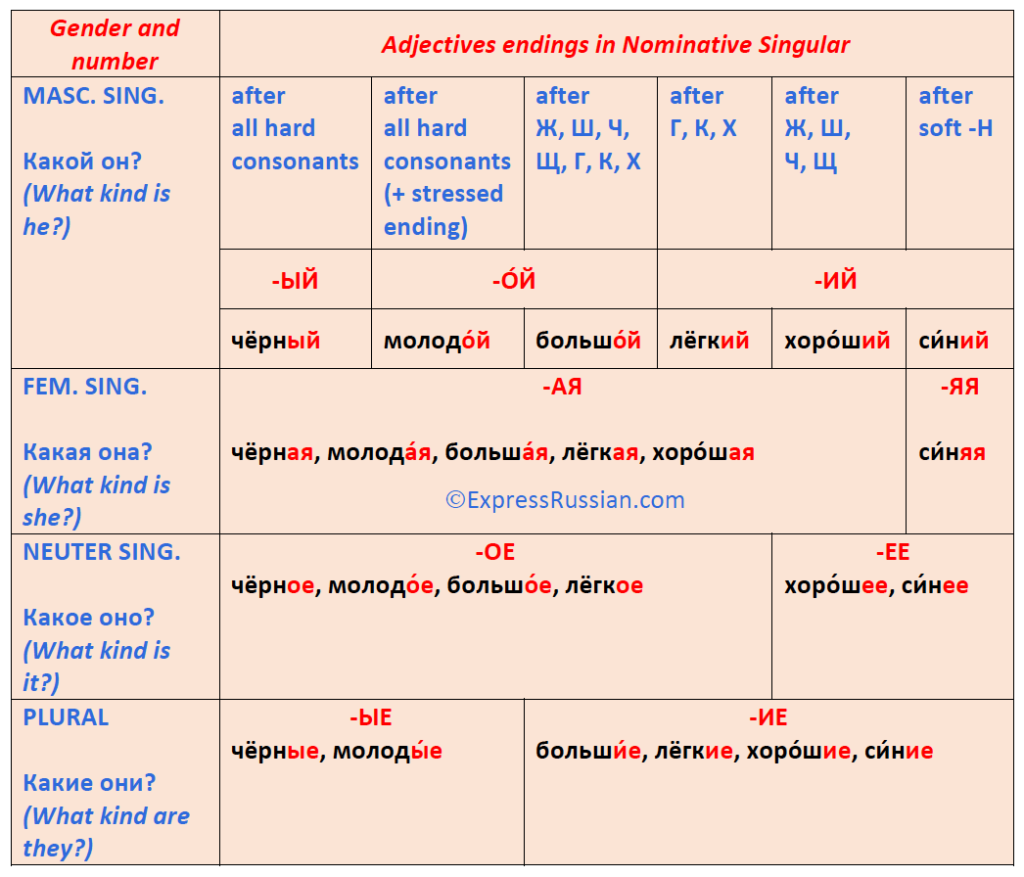Adjectives are an integral part of sentences, they describe the noun (quality, color, type etc) and answer the question What kind?
In this article:
Genders of Russian adjectives
Russian adjectives, like Russian nouns, can be of three genders – masculine, feminine or neuter, depending on the gender of the noun. They can have singular and plural form.
The endings will vary according to the gender and number. Plural form is the same for all genders.
Types of Russian Adjectives
Most Russian adjectives are so-called hard adjectives, they have a stem (or root) ending in a hard consonant. In other words, the last letter before the ending is a hard consonant, like н in чёрный (black) or л in белый (white).
In the nominative case, such adjectives have the ending:
-ый (for masc. sing.): чёрный кот
-ое (for neuter, sing.): Чёрное море
-ая (for fem. sing.): чёрная ручка
–ые (for plural form which is the same for all genders): чёрные карандаши
However, if the preceding letter before the ending is г, ж, к, х, ч, ш, щ (so-called 7-letter spelling rule), the ending will have и, not ы. Therefore, the adjectives whose stem ends in one of these seven letters have the ending -ий instead of -ый.
There is a group of adjectives called soft adjectives: they always have a stress on the stem, as in си́ний (dark blue).
The adjectives with a stem ending in the soft н sound acquire the endings:
-ий (Nom. masc, sing.): синий цвет
-ее (Nom. neuter, sing.): синее небо
-яя (Nom. fem., sing.): синяя блузка
-ие (Nom. plural): синие карандаши
There is a small group of adjectives called stressed adjectives. They have the ending -ой instead of -ый or -ий in the nominative masculine singular. This ending always has a stress (accent mark) on the letter o:
молодóй (young), большóй (big), другóй (another).
Please find below the joint table with all the possible endings of Russian adjectives in Nominative case (or in their initial form)

Russian adjectives declension (conjugation by cases)
The most important thing to keep in mind about Russian adjectives is that
adjectives in the Russian language agree with nouns in gender, number, and case.
Therefore, while studying Russian adjectives, it is indispensable to learn their conjugation by cases.
Related: Russian Cases
So, if the noun is in Genitive (Gen.), the adjective must be in Genitive too, and have the same gender (masc., fem. or neuter) and number (sing. or plural) as the noun.
For example, if you want to say, “a black pen”, start with the word “pen” = “ру́чка”: it is in the nominative-feminine-singular form.
Then you should adjust the form of the adjective describing it. The dictionaries give you the nominative-masculine-singular form of adjectives by default: these will almost always end in “-ый” or “-ий”. For our expression, you’d find “чёрный” (black) in the dictionary but knowing that you’ll need the feminine form to match with “pen” = “ручка”, you should transform “чёрный” into “чёрная”.
See how you form gender-, number- or case-related endings:
(Nom., fem., sing.) чёрная ру́чка (black pen)
(Nom., masc., sing.) чёрный кот (black cat)
(Nom., neuter., sing.) Чёрное мóре (Black Sea)
(Gen., fem., sing.) чёрной ру́чки (black pen)
(Gen., masc., sing.) чёрного котá (black cat)
(Gen., neuter., sing.) Чёрного мóря (Black Sea)
The topic of Russian cases and conjugation of various parts of speech by Russian cases is explained in detail in our book Russian Cases: Conjugate Russian nouns, pronouns, and Adjectives like a PRO!
See which learning format fits you the best!
Got questions? Contact us!
Follow us for educational content on




